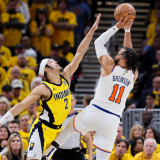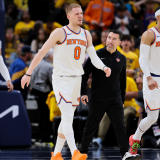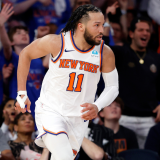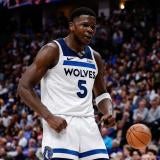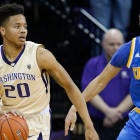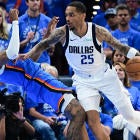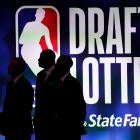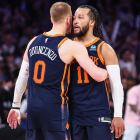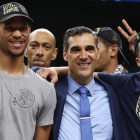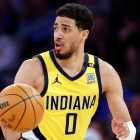The NBA Draft is the closest thing to Christmas in June, when NBA fans get to look under their tree and see the newest toys and gadgets their team soon gets to play with.
Sometimes NBA fans know what they're getting well before Christmas-in-June arrives, and they can't wait (see: Anthony Davis, LeBron James). Sometimes fans are furious at their present, but it turns out their owner knew more than they did, and in time the present ended up becoming amazing (see: Kristaps Porzingis). Sometimes fans are incredibly excited but the present breaks before they can play with it (see: Greg Oden). And sometimes the present is exactly what they wanted, but soon enough they get bored with it and turn to other diversions (see: Derrick Williams, and so many others).
The NBA Draft has it all: Young men loaded with hope and potential, front offices trying to outsmart the other 29 teams, engaged fan bases who will leave either excited, angry or confused, and the human drama of not knowing what will come next.
This year's draft? Well, it's amazing. It's the deepest draft in recent memory. While there is no can't-miss, transcendent superstar in this group a la LeBron James or Karl-Anthony Towns, there's somewhere between 10 and a dozen players who scouts believe have legitimate All-Star potential. A few of those could become household names, superstars who in time dominate the league.
Here's the final update of this remarkable draft's top 100 prospects. Enjoy.
Reid Forgrave's NBA Draft Big Board
1. Markelle Fultz, PG, Washington
- Strengths: He has the ideal NBA body – 6-5 with a 6-10 wingspan – and an ideal, versatile offensive skill set to become a star combo guard in the NBA. He has elite athleticism and an uncanny ability as a scorer of the like that we haven't seen in a collegiate guard in years. He's a great outside shooter, hitting 41.3 percent of his 3-pointers, and willing to take contact on drives. Fultz is the real deal.
- Weaknesses: There aren't many. Fultz's defense can become lackadaisical, at least it seemed that way at Washington. But perhaps that's a byproduct of playing for a team that was a lost cause before conference play started. He can sometimes play hero ball, but again, it's uncertain whether that's a byproduct of being the only big-time talent on a struggling team.
- Analysis: The only thing that gives pause about Fultz is where he chose to go to school, and how that team did. Washington only won nine games. Yes, he was surrounded by a bunch of spare parts. But are you sure you want to spend the top pick in a stacked draft on a guy who only won nine games in his sole college season?
2. Lonzo Ball, PG, UCLA
- Strengths: If there's one thing that makes Ball stand above others, it's that he makes everyone around him better. UCLA went from a sub-.500 team a year ago to a legit national title contender with Ball at the point. As a scorer, what remarkable about Ball is how little he misses the mark. Ball was ninth in college hoops in effective field goal percentage, and amazingly was fourth in 2-point percentage, surrounded by a bunch of big men. He intuitively understands what it means to be an efficient scorer.
- Weaknesses: Um, his dad? Actually, that's utterly unfair. As bombastic as LaVar Ball has shown to be, all indications are that he's raising confident, grounded children. Lonzo seems to laugh off his dad's craziest tendencies and appreciate his best attributes. As a basketball player, Lonzo's awkward shooting mechanics stand out, but when you're shooting upwards of 41 percent from three as a college freshman, there's no need to mess with it.
- Analysis: Ball is the most intriguing player in this draft. He's a unique player who will bring an exciting, marketable brand of basketball to wherever he lands. Simply put, he's a winner. A can't-miss type of prospect.
3. De'Aaron Fox, PG, Kentucky
- Strengths: Speed, speed, speed. John Calipari told me Fox may be the fastest player he's ever coached. You can't teach speed. And Fox was right when he recently told a reporter that he's a better defender than both Fultz and Ball; indeed, Fox is the best two-way point guard in this draft. His brain works nearly as fast as his body; once the game fully slows down for him, watch out.
- Weaknesses: 3-point shooting. A 24.6 percent rate from 3-point land like Fox had in college could hamper every part of his offensive game in the NBA, as defenders will sag off him and beg him to shoot.
- Analysis: This may be crazy but there's a good chance that Fox could become not just the best point guard but the best player in this entire draft. (I know that's heresy to everybody who believes there's a top tier that includes just Fultz and Ball, but whatever.) It'll just take his three-point shot to get to a competent level and Fox could become a John Wall-like player.
4. Jayson Tatum, SF, Duke
- Strengths: Tatum's silky smooth game is a joy to watch. He has one of the most technically advanced offensive games in this draft. That's what happens when a high school kid gets to the gym every day at 5:45 a.m. to work on fundamental things like his footwork going into his fadeaway. Tatum is the type of long, lanky wing who can do it all as a scorer, especially with his rapidly developing outside shot. As a mid-range shooter, Tatum has the ability to master that lost art in a few years.
- Weaknesses: His biggest weakness is that he's not an elite athlete. That's what scouts keep telling me. But he's certainly not a poor athlete, and as he continues to add muscle to his frame, he'll be able to find more ways to muscle his way into position.
- Analysis: Will Tatum become a No. 1 option for a good team? Don't think so. Could he become a second third option for a team that could contend for a championship? Yep. He's a high-character, high-floor kid, perhaps not a foundational piece but the type of guy who could round out a team that already has some talent.

5. Josh Jackson, SF, Kansas
- Strengths: A physical freak, and a dynamic two-way player. Jackson's aggressiveness is second-to-none. It feels like he can be all over the court. As a defender, Jackson is eye-popping: blocks, steals, deflections. He'll play with confidence the moment he steps foot in an NBA gym.
- Weaknesses: The character question. It's never good when a young man who is months away from becoming a top-five pick and a millionaire is accused of vandalizing a Kansas women's basketball player's car and threatening physical violence against her. You better believe general managers are grilling Jackson about this. From a basketball perspective, Jackson needs to improve on his outside shooting, though it's certainly passable.
- Analysis: Jackson is certainly in this draft's top tier - the six or seven players who may end up the best individual talent in this draft. He could be the best two-way player in this draft. He's not as freakish of a physical specimen as Kawhi Leonard, but the comparison isn't far off.
6. Jonathan Isaac, SF, Florida State
- Strengths: A near 7-footer with elite athleticism for his size, Isaac can plausibly guard all five positions in the NBA. A late growth spurt means that Isaac comes with the skills of a wing player despite the height of a center. While his offensive game is far from complete, Isaac is a helluva shooter for a big man, making 34.8 percent of his 3-pointers and shooting 78 percent from the free-throw line.
- Weaknesses: He's rail thin, which is exactly what you'd expect for a 19-year-old who had a late growth spurt, and he struggles with physical play.
- Analysis: Isaac will take a patient team. But that patience could pay off in time – and in a really big way – with a player that one scout said could be in the rarefied air of "physical freaks" in the NBA.
7. Lauri Markkanen, PF, Arizona
- Strengths: He's a 7-footer who on the offensive end doesn't play at all like a typical 7-footer. Markkanen shot a ridiculous 42.3 percent from 3-point range, making himself one of the best shooting 7-footers in NCAA history. He's mobile and strong, with great fundamentals on both ends of the court and great creativity on the offensive end.
- Weaknesses: Consistency. There was a four-game stretch in the middle of Pac-12 play when Markannen absolutely disappeared, making only five shots over 106 minutes. And while his physical profile is impressive – he's a mobile 7-footer, for God's sake – he's not an elite athlete, and his wingspan isn't something that's a physical strength.
- Analysis: Is he Dirk? Of course not – nobody's Dirk. But the Dirk comparison fits in many ways, a versatile European seven-footer who can fill it up from anywhere on the court. He'll be an incredible asset in today's NBA.
8. Malik Monk, PG, Kentucky
- Strengths: A superb athlete and a fantastic shooter. Monk can light it up from deep like no other player in this draft. In practices you can see how his hard work ethic ends up paying off in games.
- Weaknesses: He's incredibly streaky. You'd see a player who'd be ice cold during the first half and then suddenly, in a span of a few minutes in the second half, absolutely take over a game. And while his size – 6-3 – is more the size of a point guard, he's most certainly a shooting guard, which could bring some struggles defensively against bigger NBA shooting guards.
- Analysis: Along with Fultz and Ball, Monk is among the most exciting players in this draft. His physical limitations, if you want to call them that, are balanced out by his incredible athleticism.
9. Dennis Smith Jr., PG, NC State
- Strengths: He's a bit on the small side, but Smith is mighty, one of the most explosive players in this entire draft.
- Weaknesses: Inconsistency. Smith scored 32 points in a stunning January upset at Duke – that's good! Smith scored a season-low seven points and had four turnovers in his final collegiate game – that's bad. Smith came back impressively from a torn ACL a little more than a year ago – that's good! Smith's coach at N.C. State got fired after his team's sub-.500 season – that's bad.
- Analysis: Inconsistency in season-long results, and inconsistent individual play from game to game: That's the Dennis Smith story. He certainly has the physical attributes to shine in the NBA on the offensive and defensive ends. But does he have a focused head on his shoulders to be a point guard his team believes in?
10. Zach Collins, C, Gonzaga
- Strengths: Solid, solid, solid. We got to see Zach Collins' best college game on the biggest of stages when he dropped 14 points, 13 rebounds and six blocks on South Carolina in the Final Four. While he'll never be called spectacular, there are few holes in Collins' game. He combines size and mobility, touch and strength.
- Weaknesses: What kind of sample size are we working off of here? Collins shined at Gonzaga, but that was in limited minutes; he averaged fewer minutes per game (17.3) than any other projected lottery pick.
- Analysis: If Collins can stretch his range and become a consistent NBA 3-point shooter, he could be a very impactful player in the NBA. You're not going to get a star here. But you'll have a great chance at getting a very solid all-around two-way big man, and that's a valuable thing.
| RK | PLAYER | SCHOOL | YEAR | POS | HT | WT |
|---|---|---|---|---|---|---|
| 11 | Luke Kennard | Duke | Soph | SG | 6-6 | 202 |
| 12 | Frank Ntilikina | INTL | - | PG | 6-5 | 170 |
| 13 | John Collins | Wake Forest | Soph | PF | 6-10 | 235 |
| 14 | Donovan Mitchell | Louisville | Soph | SG | 6-3 | 195 |
| 15 | OG Anunoby | Indiana | Soph | SF | 6-8 | 235 |
| 16 | Justin Jackson | N. Carolina | Jr | SF | 6-8 | 210 |
| 17 | Harry Giles | Duke | Fr | PF | 6-10 | 240 |
| 18 | Jarrett Allen | Texas | Fr | C | 6-11 | 235 |
| 19 | Justin Patton | Creighton | Fr | C | 7-0 | 230 |
| 20 | Ike Anigbogu | UCLA | Fr | PF | 6-10 | 250 |
| 21 | Edrice Adebayo | Kentucky | Fr | C | 6-10 | 260 |
| 22 | Terrance Ferguson | INTL | - | SG | 6-7 | 186 |
| 23 | Caleb Swanigan | Purdue | Soph | PF | 6-9 | 250 |
| 24 | TJ Leaf | UCLA | Fr | PF | 6-10 | 225 |
| 25 | Johnathan Motley | Baylor | Jr | PF | 6-10 | 230 |
| 26 | Jordan Bell | Oregon | Jr | PF | 6-9 | 225 |
| 27 | Ivan Rabb | California | Soph | PF | 6-11 | 220 |
| 28 | Alec Peters | Valparaiso | Sr | PF | 6-9 | 235 |
| 29 | Derrick White | Colorado | Sr | PG | 6-5 | 200 |
| 30 | Kyle Kuzma | Utah | Jr | SF | 6-9 | 225 |
| 31 | Jonathan Jeanne | INTL | - | PF | - | - |
| 32 | Jawun Evans | Oklahoma St. | Soph | PG | 6-1 | 185 |
| 33 | Josh Hart | Villanova | Sr | SG | 6-5 | 215 |
| 34 | Tyler Dorsey | Oregon | Soph | SG | 6-4 | 195 |
| 35 | Isaiah Hartenstein | INTL | - | PF | 7-0 | 225 |
| 36 | Tyler Lydon | Syracuse | Soph | SF | 6-9 | 223 |
| 37 | Thomas Bryant | Indiana | Soph | PF | 6-10 | 255 |
| 38 | Semi Ojeleye | SMU | Jr | SF | 6-7 | 235 |
| 39 | Edmond Sumner | Xavier | Soph | PG | 6-6 | 186 |
| 40 | Jonah Bolden | INTL | Soph | PF | 6-10 | 220 |
| 41 | Frank Jackson | Duke | Fr | SG | 6-3 | 205 |
| 42 | D.J. Wilson | Michigan | Soph | PF | 6-10 | 240 |
| 43 | Dwayne Bacon | Florida St. | Soph | SG | 6-7 | 221 |
| 44 | Cameron Oliver | Nevada | Soph | PF | 6-8 | 235 |
| 45 | Monte Morris | Iowa St. | Sr | PG | 6-3 | 175 |
| 46 | Sindarius Thornwell | S. Carolina | Sr | SG | 6-5 | 211 |
| 47 | Jaron Blossomgame | Clemson | Sr | SF | 6-7 | 220 |
| 48 | Wesley Iwundu | Kansas St. | Sr | SF | 6-7 | 205 |
| 49 | Tony Bradley | N. Carolina | Fr | PF | 6-11 | 240 |
| 50 | PJ Dozier | S. Carolina | Soph | SG | 6-6 | 205 |
| 51 | Nigel Williams-Goss | Gonzaga | Jr | SG | 6-3 | 195 |
| 52 | Frank Mason III | Kansas | Sr | PG | 5-11 | 190 |
| 53 | Dillon Brooks | Oregon | Jr | SF | 6-7 | 225 |
| 54 | Melo Trimble | Maryland | Jr | PG | 6-3 | 185 |
| 55 | Kennedy Meeks | N. Carolina | Sr | C | 6-10 | 260 |
| 56 | Isaiah Briscoe | Kentucky | Soph | PG | 6-3 | 210 |
| 57 | Nigel Hayes | Wisconsin | Sr | PF | 6-8 | 240 |
| 58 | L.J. Peak | Georgetown | Jr | SG | 6-5 | 215 |
| 59 | Kobi Simmons | Arizona | Fr | PG | 6-5 | 175 |
| 60 | Devin Robinson | Florida | Jr | SF | 6-8 | 200 |
| 61 | Mathias Lessort | INTL | - | PF | 6-9 | 250 |
| 62 | Peter Jok | Iowa | Sr | SG | 6-6 | 205 |
| 63 | Luke Kornet | Vanderbilt | Sr | C | 7-1 | 250 |
| 64 | Charles Cooke | Dayton | Sr | SG | 6-5 | 196 |
| 65 | Damyean Dotson | Houston | Sr | SF | 6-5 | 210 |
| 66 | Chance Comanche | Arizona | Soph | C | 6-11 | 215 |
| 67 | Kris Jenkins | Villanova | Sr | SF | 6-6 | 235 |
| 68 | Antonio Blakeney | LSU | Soph | SG | 6-4 | 197 |
| 69 | Isaac Humphries | Kentucky | Soph | C | 7-0 | 255 |
| 70 | Deonte Burton | Iowa St. | Sr | SG | 6-5 | 250 |
| 71 | Luke Fischer | Marquette | Sr | C | 6-11 | 250 |
| 72 | Austin Nichols | Virginia | Jr | SF | 6-9 | 234 |
| 73 | Andrew White III | Syracuse | Sr | SF | 6-7 | 210 |
| 74 | Marcus Marshall | Nevada | Sr | SG | 6-3 | 200 |
| 75 | Sterling Brown | SMU | Sr | SG | 6-6 | 230 |
| 76 | Eric Mika | BYU | Soph | PF | 6-10 | 230 |
| 77 | Anzejs Pasecniks | INTL | - | C | 7-1 | 225 |
| 78 | Maurice Watson Jr. | Creighton | Sr | PG | 5-10 | 175 |
| 79 | Jacob Wiley | E. Wash. | Sr | PF | 6-7 | 220 |
| 80 | Isaiah Hicks | N. Carolina | Sr | PF | 6-9 | 242 |
| 81 | Alpha Kaba | INTL | - | PF | 6-10 | 235 |
| 82 | Marcus Keene | C. Michigan | Jr | PG | 5-9 | 175 |
| 83 | Kadeem Allen | Arizona | Sr | PG | 6-3 | 205 |
| 84 | Jordan Mathews | Gonzaga | Sr | SG | 6-4 | 203 |
| 85 | Zak Irvin | Michigan | Sr | SF | 6-6 | 215 |
| 86 | Derrick Walton Jr. | Michigan | Sr | PG | 6-1 | 190 |
| 87 | James Blackmon Jr. | Indiana | Jr | SG | 6-4 | 200 |
| 88 | V.J. Beachem | Notre Dame | Sr | SG | 6-8 | 201 |
| 89 | Jaylen Johnson | Louisville | Jr | PF | 6-9 | 230 |
| 90 | Paris Bass | Detroit | Soph | SF | 6-8 | 200 |
| 91 | Davon Reed | Miami (Fla.) | Sr | SG | 6-6 | 220 |
| 92 | Michael Young | Pittsburgh | Sr | PF | 6-9 | 235 |
| 93 | Landen Lucas | Kansas | Sr | C | 6-10 | 240 |
| 94 | Amida Brimah | UConn | Sr | C | 7-0 | 230 |
| 95 | Malcolm Hill | Illinois | Sr | SF | 6-6 | 225 |
| 96 | Chris Boucher | Oregon | Sr | PF | 6-10 | 200 |
| 97 | George de Paula | INTL | - | PG | 6-6 | 194 |
| 98 | Przemek Karnowski | Gonzaga | Sr | PF | 7-1 | 300 |
| 99 | Vlatko Cancar | INTL | - | SF | 6-8 | 210 |
| 100 | Aleksandar Vezenkov | INTL | - | PF | 6-9 | 225 |








